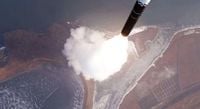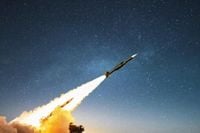On May 8, 2025, tensions escalated in East Asia as North Korea launched several ballistic missiles into the Sea of Japan. Reports indicate that the missiles traveled approximately 800 kilometers before crashing into the waters, prompting immediate concern from regional allies.
The South Korean military, alongside intelligence services from the United States, had been monitoring preparations for these missile tests. According to a statement from the Joint Chiefs of Staff of South Korea, the launches were tracked in real time, and information was swiftly communicated to allied nations, including Japan.
Currently, a technical analysis is being conducted to assess the trajectories, characteristics, and intended targets of the missile launches. South Korean military officials have condemned North Korea's actions, describing them as provocations that threaten regional security.
This missile launch follows a pattern of military activity from North Korea, which has been particularly pronounced in recent months. Notably, this event comes just two months after a similar incident on March 10, 2025, when North Korea launched several ballistic missiles coinciding with joint military exercises conducted by South Korean and U.S. forces.
In a related development, the Russian nuclear submarine missile cruiser Krasnoyarsk successfully launched a Kalibr cruise missile towards the Kura training ground in Kamchatka, reaching a distance of 1,100 kilometers. This test adds another layer of complexity to the already tense military landscape in the region.
Amid these developments, South Korean officials have ramped up surveillance efforts, maintaining a heightened state of readiness for any further missile activity from the North. They are closely coordinating with U.S. and Japanese forces to ensure comprehensive monitoring of the situation.
Despite the heightened tensions, Japanese government representatives assured the public that there is currently no immediate threat to Japan stemming from North Korea's missile launches. This reassurance comes as the Japanese media reports on the ongoing provocations from Pyongyang.
Experts note that North Korea's recent missile tests reflect a broader strategy to assert its military capabilities, especially in light of its increasing military collaboration with Russia, which continues to engage in the conflict in Ukraine. The geopolitical implications of these developments are significant, as they may influence the security dynamics across Northeast Asia.
As the situation unfolds, the international community remains watchful, aware that North Korea's missile tests could lead to further escalations. The South Korean military's proactive approach in sharing intelligence and coordinating with allies may play a crucial role in maintaining stability in the region.
In summary, the missile launches by North Korea on May 8 mark a significant moment in ongoing tensions in East Asia. With South Korea and the United States on high alert, the potential for further provocations looms large in the coming days.


